13 September, 2019 | Resource and waste management
Prof David C Wilson took part in a panel discussion at the RWM with CIWM exhibition and conference at the NEC in Birmingham this week. He made the point that while we already know what needs to be done to extend municipal solid waste management services to the unserved half of the World’s population, the UN sustainable development goals (SDGs) are critical to unlocking the political will to make it happen.
Extending waste collection to everyone and eliminating open dumping and burning would specifically address targets under SDGs 11 (sustainable cities), 12 (responsible consumption and production) and 6 (clean water and sanitation). But it would also halve the quantities of plastics reaching the oceans (SDG14 life below water) and contribute to climate mitigation (SDG13) and public health (SDG3). Local recycling would also contribute significantly to SDG8 (livelihoods) and SDG1 (end poverty).
DCW is currently drafting a chapter on SDGs as a driver for change, for an upcoming Routledge Handbook on the circular economy.
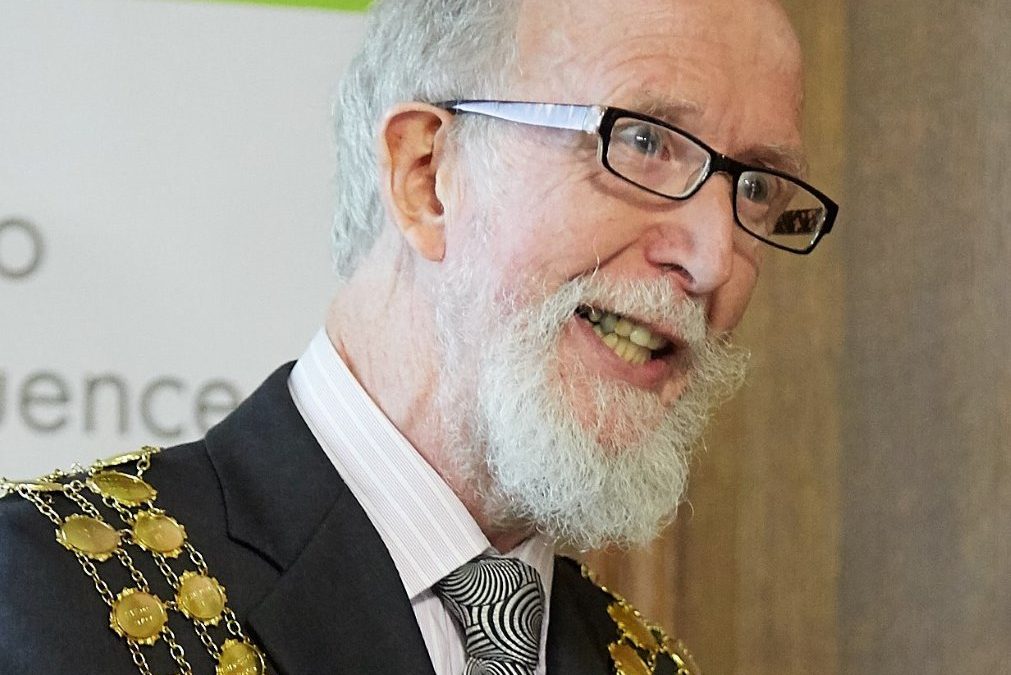
18 October, 2017 | Awards, Resource and waste management
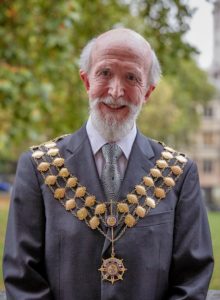
Professor David C Wilson following his inauguration in Westminster as 2017-18 CIWM President
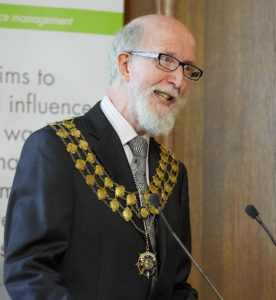
Professor David C Wilson giving his inauguration speech as CIWM President 2017-18
https://samtech.edu/accutane-treating/
Professor David C. Wilson has been inaugurated as the 102nd President of CIWM, the UK and Irish professional body for resources and waste, at a reception in London. He described solid waste management as one of the key utilities and said that as public sector budgets continue to come under pressure, “we must not lose sight of where we have come from, that the service exists first and foremost to protect public health”. He highlighted the ‘global waste management emergency’, where 40% of the World’s population lacks this basic utility service. He also launched his Presidential report, Making Waste Work: A Toolkit, prepared by WasteAid UK and aimed at helping unserved communities in the least developed countries to help themselves, by developing self-sustaining businesses making useful products for the local market from the resource value in their waste.
Outlining the importance of legislation in the substantial progress that has been made in the sustainable and safe management of waste since the early 1970s, Professor Wilson added that there can be no softening of the regulatory framework. “Two major priorities for CIWM in the UK are to ensure that following Brexit we have continuity of the strong regulations on which the very existence of the waste and resources industry depends, and the continuing fight against waste crime.”
While continuity is important on one hand, DCW went on to talk about the step change in approach to resources and waste that is happening, and he called for a “necessary parallel focus on the 3Rs – reduce, reuse, recycle – and on the shift from the linear model to a circular economy where resource efficiency and productivity is key”. An integrated and inclusive approach will be needed, he said, as well as a balanced set of policy drivers.
Professor Wilson highlighted that, despite the progress that has been made, more than 2 billion people have no waste collection at all and the waste of over 3 billion people is either dumped or subject to uncontrolled burning. This matters: for example, children growing up in households without waste collection have double the rate of diarrhoea and six times the rate of acute respiratory infection; and open burning of waste could double the current, official IPCC estimates of the contribution of methane emissions form landfill of waste to global warming. However, he also sees this ‘global waste management emergency’ as an opportunity for the international community. “If we can increase the proportion of existing international development finance being directed at SWM from the current, fairly derisory, 0.3% to just 3% up to 2030, as recommended in the GWMO, then not only can we extend waste collection to all and eliminate open dumping and burning of waste, but due to the cross-cutting nature of waste management, we can also make progress against no fewer than 12 out of the 17 UN Sustainable Development Goals agreed by world leaders to achieve a sustainable future for our planet.”
Press coverage:
Resource: Community waste schemes, the global waste crisis, domestic issues, DCW’s life in waste.
Waste Management World: Waste as a utility, domestic issues, the global waste emergency.
Letsrecycle.com: Global waste emergency, community waste toolkit
Recycling Waste World: Community waste toolkit
CIWM-journal: Waste as a utility, domestic issues, the global waste emergency, community waste toolkit
Interview with DCW in CIWM Journal:
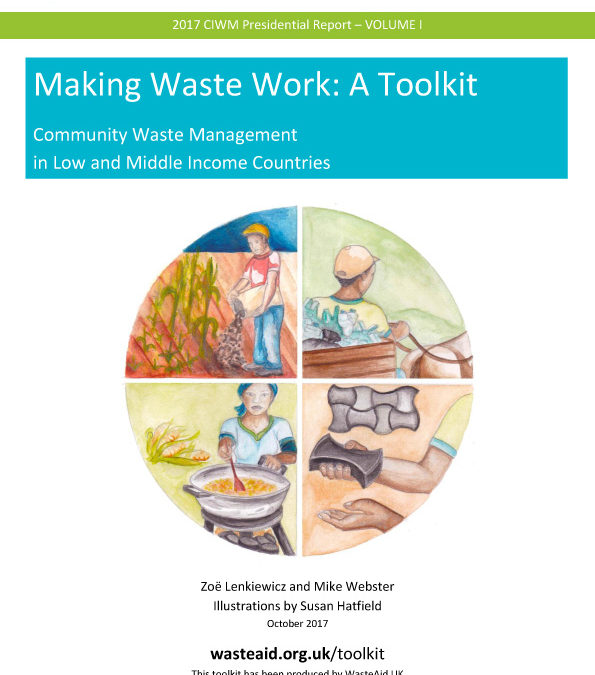
18 October, 2017 | Publication, Waste Management
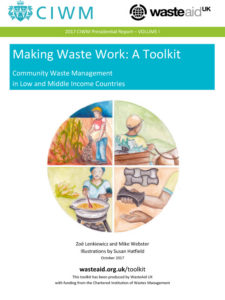
DCW’s CIWM Presidential Report 2017 prepared by WasteAid UK

Professor David C Wilson giving his inauguration speech as CIWM President 2017-18
At his inauguration on 17th October 2017, Professor David C. Wilson launched his CIWM Presidential Report: Making Waste Work: A Toolkit – Community Waste Management in Low and Middle Income Countries. The aim is to help poor communities in the least developed countries, part of the 40% of the World’s population who lack access to any solid waste management services, to help themselves by developing self-sustaining businesses making useful products for the local market from the resource value in their waste. WasteAid UK have prepared this practical guidance on low cost recycling technologies, involving minimal capital investment, to help people become self-employed recycling entrepreneurs, providing a very valuable service for the health and well-being of their community, and the whole planet – as well as reducing poverty and creating sustainable livelihoods.
In his inauguration speech, DCW called on the international community to increase substantially, from the current 0/3% to 3.0%, the proportion of Official Development Assistance directed to solving the ‘global waste emergency’. But he also said that it was not enough to work with national and local governments to solve the problem from the ‘top down’. In parallel, it is necessary to work from the ‘bottom up’, helping communities in the poorest countries, where the local authority often has no funds to provide a service, to tackle the problem themselves through the resource value in the wastes. If, for example, food wastes or plastics are kept separate, they can be turned into new, useful products. One of the gaps identified by UNEP’s Global Waste Management Outlook ( GWMO – for which DCW was the lead author) was for practical guidance on low-cost ‘waste to wealth’ technologies which involve minimal capital investment and make products to sell in a local market.
Making Waste Work: A Toolkit has been developed by WasteAid UK to fill that gap, providing accessible and well-illustrated guidance designed for use by local practitioners. An early draft of the report was field tested at a pan-African workshop in The Gambia. Volume 1 covers part A, Be informed: Community waste management essentials, and part B, Be prepared: How do I make a waste project happen? Volume 2 covers part C, Be inspired: Step-by-step guides, which include measuring what is in your waste, five technologies for recovering value from organic wastes, four focusing on plastic wastes, plus waste collection and safe disposal of the residual wastes. There is also a short Executive Summary. The links above are to the three reports on the CIWM website; the dedicated WasteAid Toolkit homepage gives access to all the material, including the individual How-to guides, in separate user friendly formats designed for mobile devices and for laptops/ desktops.
4 April, 2017 | Conference, Waste Management
An international workshop on community resilience and waste management will be taking place in The Gambia 25-30 April 2017. Organised jointly by the Arkleton Trust and WasteAid UK, the event will involve communities from The Gambia, Senegal, Ethiopia, Kenya, Malawi, Uganda, Cameroon, Nigeria and India. WasteAid UK is currently undertaking David Wilson’s Presidential Project for the Chartered Institution of Wastes Management (CIWM), to compile practical guidance on how to provide community level waste management and how to develop waste and recycling livelihoods. The workshopwill allow this guidance to be tested and developed further, ensuring it fits closely with the needs of the target users.
The first part of the workshop will focus on community resilience, encouraging attendees to share their experiences and good practice in anticipating risk, limiting impact, and ways to survive, adapt and grow stronger. Nicola Swan of the Arkleton Trust, an expert in rural development and knowledge exchange, said: “The workshop will provide a creative space for grassroots community practitioners, leaders and policy makers to come together and share experiences and knowledge, and to learn from each other. The ingenuity of communities to succeed is profound and many communities have addressed issues in innovative ways. Lack of infrastructure and other systemic issues remain a challenge though, and for this reason, we will be inviting a few policy makers and academics to benefit from the opportunity to hear things ‘from the horse’s mouth.’”
https://samtech.edu/cheap-viagra/
The second part of the workshop will cover waste management as a key tool for resilient communities. Waste that is not managed can become a hazard for people and wildlife. With simple recycling skills, however, people can keep their communities clean, create jobs and earn an income. WasteAid UK and other recycling specialists will be sharing recycling skills such as making charcoal from woody waste, fertiliser from food waste, and construction materials from plastic waste. WasteAid UK previously set up the Brikama Waste Reprocessing Centre in 2016 in partnership with Women’s Initiative The Gambia and is currently developing a Guide to Community Waste Management, with funding from CIWM, which will be reviewed by workshop participants. Mike Webster of WasteAid UK said: “Improving waste management is vital for communities to prosper and stay healthy. The event will allow skill sharing between community waste managers located in geographically diverse parts of sub-Saharan Africa, and will help WasteAid UK improve the techniques that turn waste into an economic opportunity”.
1 April, 2016 | Waste Management
UNEP’s inaugural Global Waste Management Outlook (GWMO), which DCW edited, estimates that around 2 billion people worldwide still lack access to regular waste collection; while a larger number, around 3 billion, lack access to controlled disposal services for municipal https://www.babyscanclinic.com/blog/buy-cialis-tadalafil-online-20-mg/ solid wastes. WasteAid UK is a relatively new development charity set up by professionals to mobilise the UK waste and resource industry both to campaign and to address directly the global waste crisis, bringing solid waste management services to poor communities in the least developed countries. The particular niche where Wasteaid UK has chosen to focus is supporting unserved communities in Africa to recycle their wastes into sellable products, thus developing livelihoods, alleviating poverty AND establishing a sustainable solid waste collection and management system. I am proud to be the Patron of WasteAid UK, and encourage you to give us your support. Please read my blog on Responding to the global waste management crisis.




